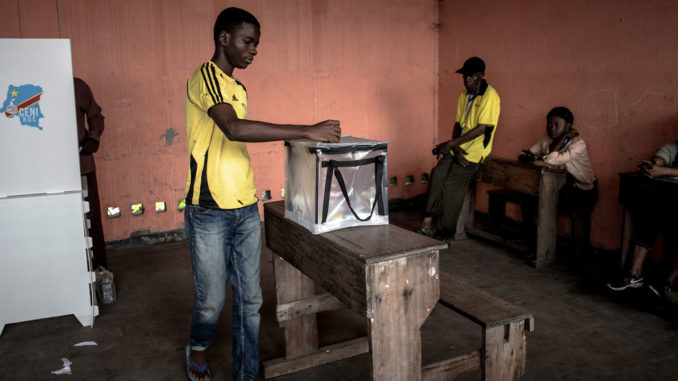
A glimmer of hope for the war-torn Congo DRC following last Sunday’s constitutional court verdict affirming the victory of Mr. Felix Tshisekedi in the December 30 polls as the country now has a new president who will be inaugurated soon. His election is the first peaceful transfer of power in the sprawling mineral rich African country and could well mark the beginning of a democratic rebirth. This is cheering news for democratisation in Africa.
The election was keenly contested between the candidate of ruling People’s Party for Reconstruction of Democracy (PPRD), Emmanuel Ramazani Shadary, a former interior minister and two leading opposition figures, namely, Martin Fajulu of the Engagement for Citizenship and Development (ECD) and Felix Tshisekedi of the Union for Democracy and Social Progress (UDPS).
Given the size of the country, communication and other logistics problems reared their heads taking over a month to collate the results, which were hotly disputed. Tshisekedi won with more than seven million votes, that is, about 38.6 per cent. Fajulu came second with 34.8 per cent while Shadary polled 23.8 per cent.
Fajulu had alleged vote rigging and objected to the electoral outcome. Leaked data from the electoral commission claimed that Fajulu won the election. Besides, about one million votes were shut out in areas where the Ebola virus outbreak was prevalent. His allegation seemed to have been backed by evidence pieces adduced by the Financial Times, which tallied the leaked electoral commission data and that of the Catholic Bishops who averred that the results were contrary to their reckoning. The situation was so upsetting that the African Union (AU) called for the delay in the release of the final results. But the constitutional court dismissed the allegations as baseless.
In spite of the ruling, Fajulu and his followers also alleged backroom deal by outgoing President Joseph Kabila to rig the vote in favour of Tshisekedi due to his party poor outing. He went further to call on the Congolese people and the international community not to recognise the leadership of Tshisekedi.
However, in the wake of the court’s decision, AU called on “all concerned to work for the preservation of peace and stability and the promotion of national harmony.” Some African leaders including the presidents of South Africa, Kenya, Tanzania and Burundi have congratulated Tshisekedi and called on all Congolese to accept the vote’s outcome. The affirmatory turn is understandable. Many prefer peace over anarchy that could distabilise further that part of the continent with domino effect on its neighbours.
In the checkered history of the continent, transition elections for the most part have not happened without electoral hiccups and charges of vote rigging. Given the authoritarian context of transition to civil rule, elections whether free and fair, are usually countenanced as a useful first-start. Congo’s 80 million people need this beginning. Tshisekedi said that much: “It is Congo that won…The Congo that we are going to form will not be a Congo of division, hatred or tribalism. It will be a reconciled Congo, a strong Congo that will be focused on development, peace and security.”
If any country has gone through a harrowing nation-building experience in modern history, it is perhaps Congo DRC. Embroiled in political crisis right from its independence from Belgium in June 1960, it has become a veritable site for political assassination, authoritarian rule and the paradox of the rich but poor.
The nationalist Patrice Lumumba who was elected first prime minister bickered with Joseph Kasa-Vubu the first president over territorial administration with secessionist bid by the provinces of Katanga and South Kasai,which attempted to secede. The conflict, which became the site of Cold War politics led to the assassination of Lumumba through the contrivances of the United States and Belgium on January 17, 1961. As an aftermath of the conflict, on November 25, 1965, Army Chief of Staff, Joseph-Désiré Mobutu, popularly known as Mobutu Sese Seko seized power and ran the country as an autocracy until May 17, 1997 when Laurent-Désiré Kabila, a leader of Tutsi forces from the province of South Kivu, became president while Mobutu fled to Morocco.
In the crisis that ensued after Kabila took over power an estimated 5.4 million people were killed. The subsequent assassination of Kabila in 2001 brought his son, Joseph to power. Mr. Kabila ran the country for 18 years. In 2015, he tried to change the constitution and abolish term limits but failed due to mass protest. He, however, refused to hold an election when his second term ended in 2016. He stayed in office for another two years but bowed to protests and pressure from regional powers.
Arguably, Congo, twice the size of Nigeria, is the richest country in the continent with huge water resources, rich soil, unique habitats for all manners of animal, plant species and abundant deposits of copper, gold, diamonds, cobalt, uranium, coltan and oil. Despite these riches, in 2016, it was ranked 176th out of 187 countries by the UN Human Development Index and about 4.5 million displaced due to fighting while about two-million children risk starvation.
All said, no one should lose sight of the emergent democratic scenario. The largely inexperienced Tshisekedi will govern with a parliament dominated by the former ruling party, which won a majority. Cooperation of the country’s social forces to roll back the daunting challenges of the past and move the country forward will be invaluable.While we appeal to the Congolese people to seize the imperative of consolidating on this minimum democratic opening for the peaceful development of their country, Tshisekedi should make his government inclusive and not a winner-take-all affair. That is the only way the new leader can find peace to rebuild the country’s broken walls.
END

Be the first to comment